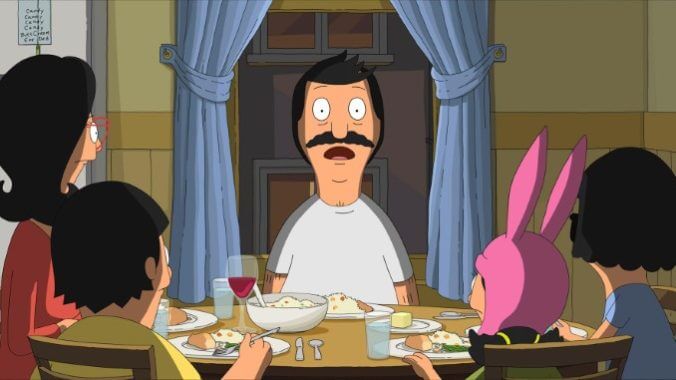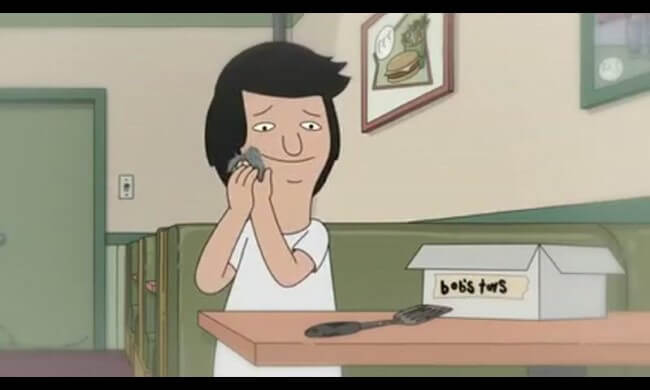Bob Belcher Is One of TV’s Best Dads, and He Really Needs a Win
Photos Courtesy of Fox
Any screenwriter knows that facing adversity is key in allowing an audience to empathize with the character they’re writing. Seeing a person struggle, fail and sacrifice in pursuit of their dreams helps us emotionally invest ourselves in the triumphs and travails of a protagonist regardless of genre, be they Rebel Alliance freedom fighters in Star Wars or the high school kids of Stranger Things. So too are fictional parents often expected to live up to standards of love, affection, understanding and sacrifice that few real-life parents can truly hope to match, but at least they’re typically heralded by viewers as parenting paragons for their trouble. If I might put in a word for one underappreciated TV parent in particular, though, let it be Bob Belcher, of Bob’s Burgers. He may just be a humble “burger man,” but the long-suffering patriarch of the Belcher clan somehow maintains both his determination and integrity, even when it would be so much easier to give up on his dreams. With that said: The guy needs a win, and he needs it badly.
It should go without saying that parenting is an exercise in self-sacrifice. But a healthy parental dynamic is also likely to include continued nurturing of both parents as individuals, and this includes enduring romance and the opportunity for individual satisfaction or fulfillment. Bob and Linda Belcher thankfully still have the former, even if their attempts at keeping the flame burning are a running gag of scheduled sex and romantic misadventures. The latter, though, is a problem for Bob in particular, because we’re seeing him at a point in his life when he’s long since stopped existing as an individual being within his family. The daily grind of running the restaurant and raising the kids has led Bob to seemingly forget over time what it was like to be able to take the smallest moment for himself, for his own satisfaction or mental health. He doesn’t even expect or demand a moment to poop on his own at this point: As Tina puts it in “Glued, Where’s My Bob,” when she says “He doesn’t expect privacy anymore; we broke him.” And indeed they have, which is a rather sad trait the character has been carrying for 13 seasons at this point.
This is not to say that Linda isn’t also a good parent, or that she doesn’t hold up her end of the bargain in keeping this kooky family going. I’m not trying to minimize Linda at all here, although it may sound that way. It’s just that I can’t help but feel a special empathy for Bob, because he tends to struggle more with the realities of their task: Keeping a perpetually struggling and failing restaurant afloat, while nurturing three strange and trying children. Compared with Linda, Bob grapples more often with the knowledge that he could be failing as a dad and as a provider. Where his wife is protected more in these situations by her own personal aura of optimism and adult naivete rather than let things like their often frightening financial situation really get to her, Bob stews on those perceived failures and lives with a constant, high-pitched background hum of anxiety. You might call him the spiritual opposite of a character like Homer Simpson, who is typically too dumb and oblivious to know he should be bothered by a problem. Bob is all too aware of the problems, such as a persistent fear that his own kids will look back on their childhoods as damaging or depressing, the way he looks back on his own childhood. This type of look at important childhood trauma is why Bob reads as closer to the “central character” of the show than Linda, because we simply understand more about why he is the way he is.
 How can you not sympathize with Bob, when his best childhood friends were a scouring pad, a rusty spatula, and a miniature dog carved out of soap?
How can you not sympathize with Bob, when his best childhood friends were a scouring pad, a rusty spatula, and a miniature dog carved out of soap?
Some of this anxiety would be ameliorated by the restaurant thriving for a change, but struggle and financial uncertainty have always been at the heart of Bob’s Burgers. This yields rich and relatable storytelling to others who have faced the same types of struggles, but it also makes the audience yearn for Bob to finally be rewarded for the talent we’ve been shown he possesses, time and time again. How many times has it been illustrated that Bob’s food is world class? From the time of Season 1’s “Burger War,” Mr. Fischoeder has acknowledged that Bob is a “beef artist” making exceptional food—including burgers that get rave reviews from critics in multiple episodes, such as Season 5’s “Best Burger.” And yet, despite the fact that everyone loves the burgers when they taste them, it somehow never translates into lasting business success. Each gain is offset by some new loss, some of which can be attributed to Bob’s relative lack of skill as a marketer, and insistence on top-notch quality rather than sleazy presentation, as exemplified by Jimmy Pesto across the street. We come to understand that Bob’s Burgers probably could be a big success, if Bob would simply give up some of his integrity and be more like Jimmy, but that’s not who he is. How can you not admire him for that?
Ways of improving the family’s stress level are likewise often presented, only to be ripped away by some zany turn of events. Bob is offered five months of free rent, for instance, by Mr. Fischoeder in “An Indecent Thanksgiving Proposal,” but the family’s meltdown during Calvin’s scheme to woo an old lover is implied to scuttle the deal, losing them a windfall that could have made a huge difference for their business. Bob is likewise offered his own “bistro on the beach” by Felix in exchange for helping him to sell Wonder Wharf to developers in the Season 4 finale, but he ultimately chooses to give up that dream for the sake of his kids, who don’t want to see the amusement park go. Such sacrifices are a long and robust pattern for Bob.
One would hope, in this case, that Bob would at least have activities to engage in for his own fulfillment—the occasional “me time” in which he could commiserate with friends, or occupy his mind with anything other than the restaurant or the kids. Linda has some of those things—hobbies, gal pals, etc—but Bob is so focused on the anxiety-laden realities of daily life that his own wife isn’t even aware that he likes to do an activity like building models in Season 1’s “Weekend at Mort’s.” For 10 years, Bob has never even found time to build “the bus from Speed,” describing model building as “a hobby of mine, back from when I could still have hobbies.” Even something as small as this, he’s perpetually set it aside for a decade, feeling as if it’s some kind of betrayal for him to do anything he enjoys or do anything that isn’t directly in service of his family. Nor does Bob have any close friends or family, beyond his restaurant regulars, who he doesn’t view as actual confidantes. Where Linda finds freedom and validation in her conversations with the likes of Gayle, Gretchen and Ginger, Bob stews with those anxieties and doubts. One wonders what a little therapy might unearth.
Perhaps no example generates more sympathy for Bob, though, than the events of Season 5’s “Late Afternoon in the Garden of Bob and Louise,” in which Bob endeavors to gain a spot in the local community garden, which will allow him to grow fresh produce for the restaurant. Immediately infatuated with the garden, and dubbing it his “happy place,” it’s a rare treat to see Bob finally find something fulfilling of his own, and you can practically see the guy’s blood pressure lowering in the process. But of course it’s not to be, as conflicts in the restaurant with the disagreeable Cynthia (the garden organizer) and teenager Logan drive Linda and Louise to anarchy, culminating in Bob having to give up the garden in order to make peace. This is an especially frustrating moment, because it would have been so easy for a compromise to be reached—Bob spends less time in the garden, and the family acknowledges that their dad could desperately use this kind of outlet. But as is almost always the case, the solution becomes simply “Bob sacrifices another thing he loves,” because that’s just what he does.
And it’s a shame, because with every one of those setbacks and disappointing outcomes, the audience’s desire to finally see Bob score the “big win” just continues to grow. Few TV father figures are more committed and devoted to their family in a way that rings true to reality, while simultaneously facing such realistic, lower-middle class hardships. If any of these dads deserve to succeed, to truly reap the fruits of their labors one of these days, then surely it’s Bob Belcher. He just can’t be a starving beefartist forever.
Jim Vorel is a Paste staff writer and resident genre guru. You can follow him on Twitter for much more film and TV writing.
For all the latest TV news, reviews, lists and features, follow @Paste_TV.







































